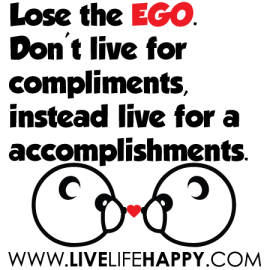1. Cool is Friendliness
Sometimes it can feel as if the world is full of rude, ill-mannered and inconsiderate people.
That is very uncool.
The thing about the people we consider to be cool is that we appreciate them for their caring nature and willingness to treat others in the way they would like to be treated.
They will give you their undivided attention and you can sense their genuine interest in you.
These kinds of people know that a friendly attitude makes a positive impact not only at an interpersonal level, but to the world as a whole.
Kindness creates a ripple-effect.
I don’t need to tell you that kind-hearted and friendly people attract more of the same into their lives, and that makes us want to spend more time getting to know them.
Applying the Friendliness Quality
Being kind and friendly makes you feel good about yourself — happier.
Make an active choice to qualify any negative feelings with something that feels better.
All of us can take the initial move towards potential friendly behavior with others.
We can all make a difference.
2. Cool is Confidence
“As we let our own light shine, we unconsciously give other people permission to do the same.” — Nelson
Mandala
To be clear, when I speak of confidence, I’m not talking about blind arrogance here — that’s another category altogether.
However, I am touching on the type of self-confidence and self-belief that is needed to have faith in your skills and creativity — the kind that helps you keep striving to realize your life goals
and dreams.
Pretty cool.
Yes, cool people have their low days and self-doubts like everyone else, but they also have the ability to overcome the fear of the unknown, set their personal-bar high and follow through with the
courage to start new things.
They are the type who continue to test their limits and skills, while forming new ideas in their quest to manifest their greatest desires.
Even when those around them are still pondering how to get started.
We naturally admire these people.
Applying the Confidence Quality
Try not to confuse confidence with ego. Rarely does one equal the other. Believing in yourself is what allows you to rise up and reach your potential. Realize that self-belief has a
cause-and-effect motion, exactly as Nelson Mandala said in the above-mentioned quote.
That is positive power imbued in exceptionally cool confidence.

3. Cool is Philosophy
Every exceptionally cool thought leader is a forward-thinking rebel by nature.
These individuals don’t much care about authority and are fast to question the ideal moral framework with regards to traditionalism, “right human conduct” and conformity.
Austin Powers provides a groovy example of a revolutionary mindset:
“If we had known the consequences of our sexual liberation, we would’ve done things much differently, but the spirit would remain the same. It’s freedom baby.”
Those with a sense of inner-freedom are the type who naturally live their life knowing the truth of John
Allen Paulos’s popular observation about life:
“The only certainty in life is uncertainty”
Very cool people are open-minded with a focus on what matters most to them — their quality, freedom and vision for life, regardless of what others think of them.
Applying the Philosophy-Quality
I’m not suggesting that you need to break the law, wave your protesting-pitchforks at the next “extremists” rally or host psychedelic orgies to be cool.
But do try to make the time for introspection — stretch your awareness to encompass self; go deep and ask the important questions — about yourself, the world and your life purpose.
Analyze stale societal conventions that may be holding you back.
You see, opening your mind to new ideas is what creates positive change, improved thought-patterns and ways of being. Philosophy in a nutshell.
4. Cool is Inspiration
Just by being who you are.
A quality many cool people demonstrate is the innate love to evoke inspiration as much as they are motivated by the inspirational qualities in others.
They give and take in mutual balance as they willingly share what they know minus the airs and graces.
That is, without being condescending or expecting something in return.
I also think that cool people strive to bring out the best in you by showing trust in your potential and lending you words of encouragement.
It just feels uplifting to be around someone like that; as if you don’t need to worry about being judged, scorned or undervalued, even when you mess up.
But the best thing about cool people is that they walk-the-talk — fully backing up their words with actions, showing you what you mean to them.
Real life cool people know the power in showing up for others.
We can all do that.
Applying the Inspiration Quality
Don’t do things for people and always expect the favor returned.
Try not to say things you don’t mean or make promises you cannot keep.
Short and sweet — keep it real.
That’s inspirational.
5. Cool is Desirable
We all want to feel seen, known, and cherished by others.
Right?
It’s the feeling that drives us towards attaining love, intimacy and connection in our lives.
Attraction is the energy emanating from within that draws people closer to us.
It creates desire, intrigue, and deeper connections in relationships.
What is often misunderstood about desire and attraction is the fact that it has very little to do with your outwardly appearance and everything to do with how you feel about yourself.
Attraction happens from the inside out.
One of the coolest guys I know dated my girlfriend for a number of years.
He wasn’t overly attractive but he was smart with a voracious, magnetic personality, and he was funny as hell.
Humor is very cool. You know this.
Anyway, just being around my friend’s fella somehow switched my energy meter to high, and that made him a desirable person to hang out with.
Cool people are less likely to spend time trying to create an appearance that fits a particular aesthetic and more time cultivating an inner connection to who they are.
Applying the Desirable Quality
First, you must realize and internalize that desirability is not about what you wear but how you wear it, and it’s definitely not about what you do but how you do it.
Feeling like an attractive human being is about cultivating an inner-connection to who you are and standing strong within yourself as that person.
Appreciate and love who you are.
Self-love and self-care are key factors because when you feel good about yourself, others will find those same qualities highly appealing.
And it’s desirable.

6. Cool is Emotional Intelligence
Emotional intelligence is the ability to understand, express and control your emotions, and it is a very cool quality in a person.
Whether expressing honest feelings or dealing with a blow-up of some sort, it takes a certain level of intellectual capacity and self-awareness to remain “together” during the hard times.
Think about the people you consider to be cool.
I bet you seldom see them acting out with anger, or slicing and dicing someone with harsh words when things don’t go their way.
Cool people keep their cool.
They understand the significance of staying under control when circumstances force them to burn out.
They also realize their irrational response will achieve nothing other than to worsen the situation.
They work at dealing with problems by focusing on solutions, rather than losing their cool.
And they make sure you know that you are important to them, regardless of the circumstances.
Applying Emotional Intelligence
Emotional intelligence is mindfulness-in-action — it’s the ability to empathize, communicate effectively and defuse conflict.
Be conscious of your inner-world and immediate responses by practicing mindfulness through meditation, yoga, breathing exercises; and paying attention to the moment, your body and your
feelings.
7. Cool is the Language of Love
What sets exceptionally cool people apart from everyone else is that they see the good in others and don’t withhold expressing their love to the people they care about.
It touches our hearts so deeply to feel the truth and honesty of love.
Somehow, cool people are able to effortlessly touch you in the most meaningful and unexpected ways with their deepest truths, acts of humility and humble hearts.
They are the type of people who show you beauty where you previously saw none, as well as restoring your faith where you most need it.
That’s what cool people do — they remind us to believe that we too are worthy of great love, beauty and kindness.
Applying the Language of Love
Truly exposing yourself to the language of love can be scary because you must allow yourself to become vulnerable.
I totally get that.
However difficult it may seem, you have got to remember that love is worth every bit of putting yourself out there, as that’s what creates deeper connection and intimacy in your life
experiences.
Exposing ourselves to great love and vulnerability takes courage — take a deep breath and dip your toes in a little at a time.
Trust your intuition.
Celebrate your ability to sense and experience love deeply in this lifetime.
That’s what makes you beautifully human.
8. Cool is Being Your Authentic Self
It may very well be impossible to always operate from your authentic self, but it is entirely possible to become aware of and connect with your authenticity.
It is making the choice to merge with that immaculate, hidden part of yourself once again; learning who you really are and how to be true to that person.
Cool people know the value in authenticity and keep up the inner-work to be able to identify when their behavior or actions don’t align with their authentic nature.
They realize that to experience a meaningful life is to fully embrace who they are, holding their inner-sanctuary in a place of love and forgiveness, along with the important people in their
lives.
Exceptionally cool people empower others with their presence.
They have a knack for making you feel cool, too, just by being around them.
Applying the Authentic Quality
To find your authentic self, you’ve got to dig beneath the layers of borrowed thought processes and learned behavior, social conditioning and expectations; as well as needless education and
unnecessary moral policing.
Qualify every aspect of your life by honoring who you are. Accept, connect and strengthen how you choose to love yourself and others.
Being authentic takes real practice and effort, though it’s an important aspect of your humanity worth striving for.





















